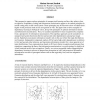Free Online Productivity Tools
i2Speak
i2Symbol
i2OCR
iTex2Img
iWeb2Print
iWeb2Shot
i2Type
iPdf2Split
iPdf2Merge
i2Bopomofo
i2Arabic
i2Style
i2Image
i2PDF
iLatex2Rtf
Sci2ools
108
click to vote
IJON
2007
2007
Information maximization in face processing
This perspective paper explores principles of unsupervised learning and how they relate to face recognition. Dependency coding and information maximization appear to be central principles in neural coding early in the visual system. These principles may be relevant to how we think about higher visual processes such as face recognition as well. The paper first reviews examples of dependency learning in biological vision, along with principles of optimal information transfer and information maximization. Next, we examine algorithms for face recognition by computer from a perspective of information maximization. The eigenface approach can be considered an unsupervised system that learns the first and second-order dependencies among face image pixels. Eigenfaces maximizes information transfer only in the case where the input distributions are Gaussian. Independent component analysis (ICA) learns high-order dependencies in addition to first and second-order relations, and maximizes informa...
Related Content
| Added | 15 Dec 2010 |
| Updated | 15 Dec 2010 |
| Type | Journal |
| Year | 2007 |
| Where | IJON |
| Authors | Marian Stewart Bartlett |
Comments (0)

